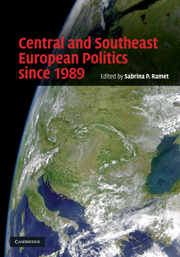Crossref Citations
This Book has been
cited by the following publications. This list is generated based on data provided by Crossref.
Fawn, Rick
2013.
International Organizations and Internal Conditionality.
p.
20.
Stojanović, Nenad
2014.
When non-nationalist voters support ethno-nationalist parties: the 1990 elections in Bosnia and Herzegovina as a prisoner’s dilemma game.
Southeast European and Black Sea Studies,
Vol. 14,
Issue. 4,
p.
607.
Dolenec, Danijela
Doolan, Karin
and
Tomašević, Tomislav
2017.
Contesting Neoliberal Urbanism on the European Semi-periphery: The Right to the City Movement in Croatia.
Europe-Asia Studies,
Vol. 69,
Issue. 9,
p.
1401.
2017.
L'Europe centrale et orientale.
p.
261.
Arpagian, Jasmine
and
Aitken, Stuart C.
2018.
Without Space: The Politics of Precarity and Dispossession in Postsocialist Bucharest.
Annals of the American Association of Geographers,
Vol. 108,
Issue. 2,
p.
445.
Sywenky, Irene
2018.
Environmental thought and ecopoetics in the cultures of post-1989 Central and Eastern Europe.
Canadian Slavonic Papers,
Vol. 60,
Issue. 1-2,
p.
256.
Berrocal, Martina
and
Salamurović, Aleksandra
2019.
Political Discourse in Central, Eastern and Balkan Europe.
Vol. 84,
Issue. ,
p.
1.
Meyers, Reinhard
2019.
Handbuch Frieden.
p.
1.
Demeter, Laura
2019.
Regime change and cultural heritage protection, a matter of state security.
International Journal of Heritage Studies,
Vol. 25,
Issue. 5,
p.
522.
Marko, Davor
2019.
Public Service Broadcasting and Media Systems in Troubled European Democracies.
p.
177.
Sojka, Aleksandra
2021.
Unconditional support?.
Politeja,
Vol. 12,
Issue. 5 (37),
p.
321.
Riedel, Rafał
and
Dobbins, Michael
2021.
Towards a better understanding of organized interests in Central and Eastern Europe.
Interest Groups & Advocacy,
Vol. 10,
Issue. 4,
p.
307.
Stojanović, Dubravka
2021.
Being a Trainee Historian in Belgrade, 1989.
Comparative Southeast European Studies,
Vol. 69,
Issue. 2-3,
p.
399.
Lovec, Marko
Kočí, Kateřina
and
Šabič, Zlatko
2021.
The stigmatisation of Central Europe via (failed) socialisation narrative.
Journal of International Relations and Development,
Vol. 24,
Issue. 4,
p.
890.
Fijałkiewicz, Michał
2021.
Ideologiczne i polityczne uwarunkowania komunikacji językowej.
Malinar, Ante
2022.
Causal Mechanisms in the Global Development of Social Policies.
p.
239.
Malinar, Ante
2022.
The role of the World Bank and the International Monetary Fund in the healthcare financing reforms in Croatia: Transfer of ideas and limited coercion.
Global Social Policy,
Vol. 22,
Issue. 3,
p.
540.
Ševkušić, Milica
Toli, Eleni
Lenaki, Katerina
Kanavou, Kalliopi
Sifakaki, Electra
Kosanović, Biljana
Papastamatiou, Ilias
and
Papadopoulou, Elli
2022.
Building National Open Science Cloud Initiatives (NOSCIs) in Southeast Europe: Supporting Research and Scholarly Communication.
Publications,
Vol. 10,
Issue. 4,
p.
42.
Džankić, Jelena
Mladenov, Mladen Rudi
and
Stahl, Bernhard
2023.
When a State Seeks a Nation and a Nation Seeks a State – EU Accession in the Foreign Policies of Montenegro and Serbia.
Journal of Intervention and Statebuilding,
Vol. 17,
Issue. 2,
p.
156.
Dobbins, Michael
Labanino, Rafael Pablo
Riedel, Rafał
Czarnecki, Szczepan
Horváth, Brigitte
and
Szyszkowska, Emilia
2023.
Organized interests in post-communist policy-making: a new dataset for comparative research.
Interest Groups & Advocacy,
Vol. 12,
Issue. 1,
p.
73.





